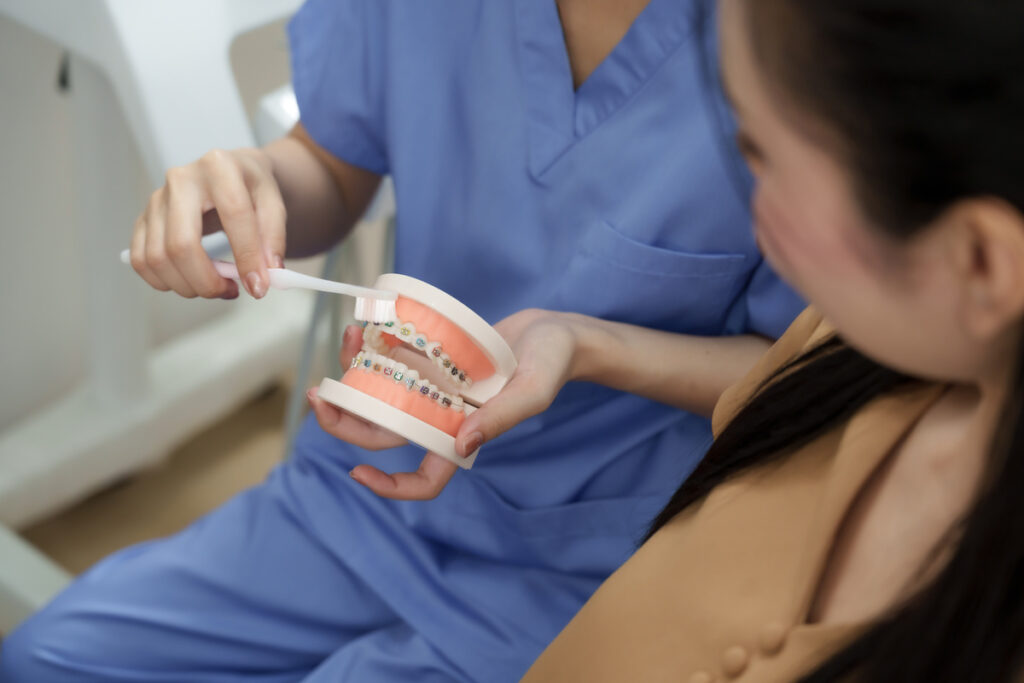The mysterious clicking or popping sound your jaw makes while chewing can range from a barely noticeable tick to an audible snap that catches the attention of others around you. This phenomenon, medically known as temporomandibular joint (TMJ) dysfunction, occurs when the small disc within your jaw joint becomes displaced or when the joint itself experiences irregular movement patterns during normal activities like eating, talking, or yawning.
At Lazzara Orthodontics, we understand how concerning these jaw sounds can be for our patients. Our team of qualified orthodontists helps identify the underlying causes of jaw popping and provides comprehensive treatment solutions to restore proper jaw function and eliminate discomfort.
Understanding Your Temporomandibular Joint
Your temporomandibular joint connects your bottom jaw to your skull and functions as a complex hinge mechanism that allows you to open, close, and move your jaw from side to side. Within this joint lies a small disc made of cartilage that acts as a pillow between the bones. When this disc slips out of its proper position or when the joint surfaces don’t align correctly, you may experience that characteristic popping sound.
Several factors can contribute to jaw popping. Teeth grinding or clenching, often occurring during sleep, places extreme pressure on the joint and surrounding muscles. Poor bite alignment can force your jaw to work harder during normal functions, leading to joint stress and eventual dysfunction. Injury to the jaw area, whether from trauma or dental procedures, can also disrupt the delicate balance within the temporomandibular joint.
When Jaw Popping Becomes a Concern
Occasional jaw popping without pain typically doesn’t indicate a serious problem. However, persistent popping accompanied by pain, difficulty opening your mouth, or locking of the jaw joint requires professional evaluation. These symptoms may indicate that progressive TMJ dysfunction can worsen without proper treatment.
Some individuals experience jaw popping primarily on one side, while others notice it occurs bilaterally. The frequency can vary from occasional episodes during certain activities to constant clicking with every jaw movement. Orthodontic treatment can address bite irregularities that contribute to TMJ dysfunction and help restore proper jaw alignment.
Signs You Should Seek Professional Care
Pay attention to additional symptoms accompanying jaw popping. Headaches, especially upon waking, may indicate nighttime teeth grinding. Ear pain or a feeling of fullness in the ears can result from TMJ dysfunction due to the joint’s proximity to the ear canal. Facial pain or tenderness in the jaw muscles often develops as these structures compensate for joint irregularities.
Difficulty chewing certain foods or changes in how your teeth fit together when you bite down can signal developing bite problems that may benefit from orthodontic intervention.
Treatment Options for Jaw Popping
Professional treatment for jaw popping depends on the underlying cause and severity of your symptoms. Traditional braces can correct bite alignment issues and contribute to TMJ dysfunction by gradually moving teeth into their proper positions. This process reduces stress on the temporomandibular joint and surrounding muscles.
For patients seeking a more hidden treatment option, Invisalign and Clarity clear aligners offer effective bite correction while remaining virtually invisible. These aligners are worn 18-20 hours daily and can address many of the same alignment issues as traditional braces. You can take clear aligners out, which makes brushing and flossing easy during your treatment.
Conservative treatments may include stress management techniques, dietary modifications to avoid hard or chewy foods, and specific exercises to strengthen jaw muscles. Night guards can protect your teeth and joints from damage caused by grinding or clenching during sleep.
Lazzara Orthodontics: Your Partner in Jaw Health
When jaw popping interferes with your daily life or causes discomfort, seeking evaluation from qualified orthodontic professionals is essential. Dr. John Lazzara brings exceptional qualifications to every patient treatment, having completed years of additional orthodontic training beyond dental school. After earning his Doctor of Dental Surgery degree from LSU School of Dentistry in 1996, Dr. Lazzara completed a 30-month residency program in orthodontics at St. Louis University, where he also earned his Master of Science degree.
Dr. Amy Bouvier Poblenz enhances our practice with her comprehensive orthodontic training and patient-centered approach. Both doctors maintain active memberships in the American Association of Orthodontists, American Dental Association, and Florida Dental Association, ensuring you receive the highest standard of orthodontic care available. Whether you need adult braces or teen treatment, our team provides personalized solutions for lasting jaw comfort and optimal oral health. Contact us today at (904) 270-8750 or schedule your consultation through our contact form.









